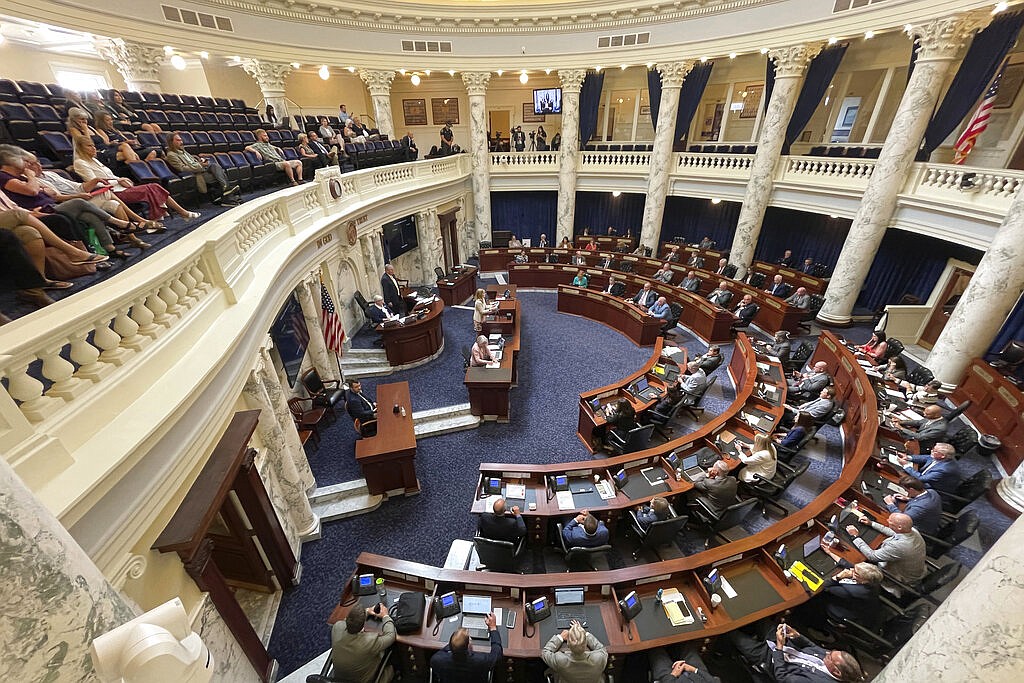Idaho lawmakers ask voters to approve special session powers
By KEITH RIDLER
Associated Press
Idaho is one of 14 states where only the governor can call a special session.
That could change Tuesday if more than half of voters approve a constitutional amendment that would rewrite the state’s constitution and allow the part-time Legislature to call itself back into session.
Typically, the Legislature meets for the first three or four months starting in January and then adjourns for the year.
Backers say the Legislature needs the power to call itself back into session to act as a check on the executive branch the entire year.
Opponents say giving lawmakers that ability is a step toward big government overreach and a full-time Legislature.
If voters approve, the Legislature could call itself back into session if 60% of lawmakers in each the House and Senate agree. The 60% is short of the two-thirds needed to overcome a governor’s veto.
The special session would be limited to a specific topic. But lawmakers have said that once gathered, the 70-member House and 35-member Senate could consider additional topics if 60% of members in each chamber agree.
The legislation, called a joint resolution, was approved in the 2021 regular legislative session, passing the House 54-15 and the Senate 24-11, clearing the two-thirds threshold needed for proposed constitutional amendments.
A joint resolution does not need a governor’s signature, but instead goes to voters as a possible amendment to the Idaho Constitution. All Democrats and some Republicans in the Legislature opposed the resolution.
That split among Republicans, who dominate the deeply conservative state, has continued leading up to Tuesday’s vote.
Former Gov. C.L. “Butch” Otter, an advocate of small government who served three terms as governor, said he opposed allowing lawmakers to call special sessions.
“As a former conservative Republican governor, I know firsthand you don’t want to mess with a good thing,” he wrote in a guest opinion piece. “Simply put, more legislative activity equals more government meddling and more regulations. Less legislative activity equals less government and fewer regulations. It is just common sense.”
But Dorothy Moon, a former state representative and now the chairwoman of the Idaho Republican Party, issued a statement supporting the change to the state’s constitution.
“I know all too well that Republicans of good-faith can come to different conclusions on important matters like amending our constitution,” she wrote. “But this issue is at the very heart of meaningful separation of powers and our representative republican form of government.”
According to the National Conference of State Legislatures, Idaho is one of 14 states where only the governor can call a special session. The other states are Alabama, Indiana, Mississippi, Texas, Arkansas, Kentucky, North Dakota, Vermont, Michigan, Rhode Island, Minnesota, South Carolina and California.
California, however, has a full-time legislature with scheduled recesses. Other states with full-time legislatures are Michigan, New York and Pennsylvania.
If Idaho voters approve the amendment, Idaho would join five states that require three-fifths, or 60%, of members in each chamber to approve a special session.
Requirements vary among the other states. Seventeen require two-thirds of lawmakers to approve a special session, while 10 only require a simple majority. Missouri requires three-fourths of the members in each the House and Senate. The presiding officers in both chambers can call a special session in Delaware and Illinois. The presiding officers in Maine can also call a special session with the consent of a majority from each political party.
The Idaho legislation to change the constitution stems from lawmaker dissatisfaction with a temporary lockdown and other restrictions that Republican Gov. Brad Little put in place in March 2020 to reduce coronavirus infections and deaths as the pandemic entered the state. The GOP-dominated Legislature had adjourned for the year by then and was powerless to do anything.
Lawmakers also said they should have had a role in spending $1.25 billion in federal coronavirus rescue money received early that year.
Since 2000, there have been five special sessions, the most recent a one-day special session on Sept. 1 where lawmakers approved, and Little signed, a massive tax cut and education spending bill made possible by the state’s projected $2 billion budget surplus.
Little called the special session due to high inflation, which he said was harming taxpayers and the education system.

